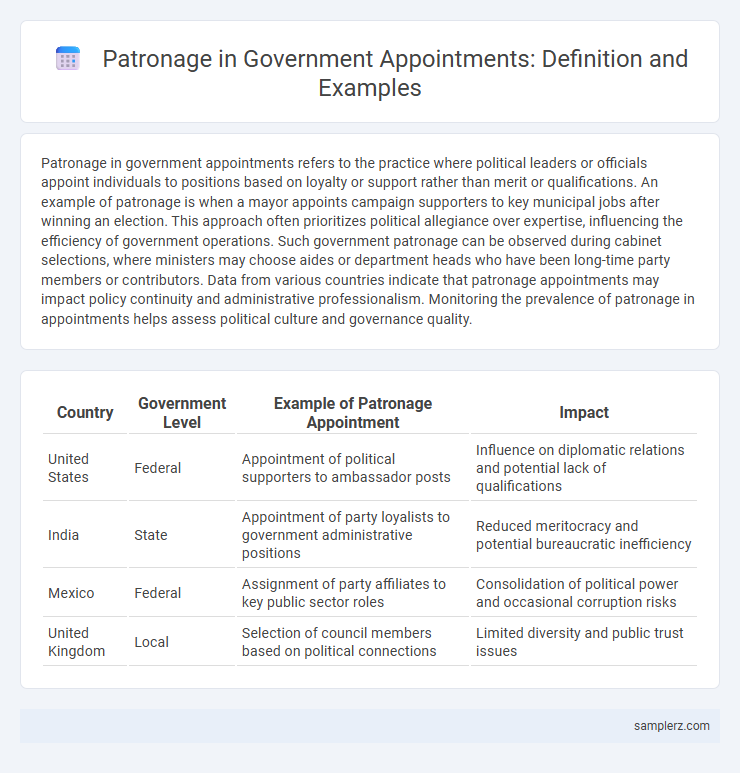Patronage in government appointments refers to the practice where political leaders or officials appoint individuals to positions based on loyalty or support rather than merit or qualifications. An example of patronage is when a mayor appoints campaign supporters to key municipal jobs after winning an election. This approach often prioritizes political allegiance over expertise, influencing the efficiency of government operations. Such government patronage can be observed during cabinet selections, where ministers may choose aides or department heads who have been long-time party members or contributors. Data from various countries indicate that patronage appointments may impact policy continuity and administrative professionalism. Monitoring the prevalence of patronage in appointments helps assess political culture and governance quality.
Table of Comparison
| Country | Government Level | Example of Patronage Appointment | Impact |
|---|---|---|---|
| United States | Federal | Appointment of political supporters to ambassador posts | Influence on diplomatic relations and potential lack of qualifications |
| India | State | Appointment of party loyalists to government administrative positions | Reduced meritocracy and potential bureaucratic inefficiency |
| Mexico | Federal | Assignment of party affiliates to key public sector roles | Consolidation of political power and occasional corruption risks |
| United Kingdom | Local | Selection of council members based on political connections | Limited diversity and public trust issues |
Understanding Patronage in Government Appointments
Government appointments often showcase patronage when officials select individuals based on political loyalty rather than merit, influencing administrative effectiveness. This practice is prevalent in various countries where party affiliation and personal connections determine key positions within ministries, agencies, and local governments. Understanding patronage in government appointments reveals its impact on policy implementation, transparency, and public trust.
Historical Examples of Patronage in Politics
Historical examples of patronage in politics include the spoils system in 19th-century United States, where political supporters were rewarded with government jobs after electoral victories. In Imperial Rome, emperors appointed loyal allies to key administrative and military positions, ensuring control over the empire. Similarly, the British political system during the 18th century saw patrons influencing parliamentary seats and government appointments to consolidate power.
Notable Cases of Patronage in Civil Service Recruitment
Notable cases of patronage in civil service recruitment include the infamous "spoils system" under President Andrew Jackson, where government jobs were awarded to political supporters rather than based on merit. The Pendleton Civil Service Reform Act of 1883 was enacted to curb such patronage by establishing merit-based appointments through competitive examinations. Despite reforms, instances of patronage persist in various government levels, often undermining public trust and administrative efficiency.
Patronage in Cabinet and Ministerial Appointments
Patronage in cabinet and ministerial appointments occurs when government leaders select allies, party loyalists, or supporters for key positions without regard to merit or qualifications. This practice often consolidates political power, impacting policy decisions and public administration efficiency. Examples include appointing close associates as ministers or cabinet members to ensure political allegiance and control over government functions.
Political Party Influence over Official Appointments
Political party influence over official appointments often manifests through the strategic placement of loyalists in key government positions, reinforcing party dominance and policy agendas. This patronage system prioritizes party allegiance over merit, impacting the efficiency and impartiality of public administration. Such practices can undermine democratic governance by limiting diversity and promoting favoritism within official appointments.
Regional Patronage Systems in Government Positions
Regional patronage systems in government positions often involve local political leaders leveraging their influence to secure appointments for loyal supporters or allies within regional administrations. These systems prioritize political loyalty and regional affiliations over meritocratic criteria, impacting the distribution of key governmental roles. Such patronage practices reinforce local power bases and can shape policy implementation at the regional level.
Impact of Patronage on Public Sector Efficiency
Patronage in government appointments often leads to the placement of unqualified individuals in key public sector roles, undermining operational efficiency and service delivery. This practice can result in decreased morale among civil servants and increased corruption risks, as loyalty outweighs merit in decision-making processes. Consequently, public trust in government institutions erodes, hindering effective governance and policy implementation.
Anti-Patronage Reforms and Their Effectiveness
Anti-patronage reforms, such as the Pendleton Civil Service Act of 1883, significantly reduced political appointments based on patronage by establishing merit-based hiring practices in the U.S. federal government. These reforms introduced competitive examinations and protections against arbitrary dismissal, promoting professionalism and decreasing corruption in public service. While challenges remain, evidence shows that meritocratic systems improved administrative efficiency and public trust in government institutions.
Patronage Appointments in Local Governments
Patronage appointments in local governments often involve selecting individuals based on political loyalty rather than merit, impacting the efficiency and impartiality of public service. These appointments can influence policy implementation and resource distribution within municipalities, shaping local governance dynamics. Such practices may undermine transparency and accountability, leading to potential conflicts of interest and reduced public trust in government institutions.
Case Studies: Scandals Involving Patronage Appointments
The 2016 Veterans Affairs scandal exposed extensive patronage in federal appointments, where unqualified individuals secured positions through political connections, undermining service quality. Similarly, the 2018 Tennessee Department of Health case revealed that patronage appointments led to mismanagement and delayed public health responses, prompting legislative scrutiny. These cases highlight systemic risks when political favoritism overrides merit-based government hiring standards.

example of patronage in appointment Infographic
 samplerz.com
samplerz.com